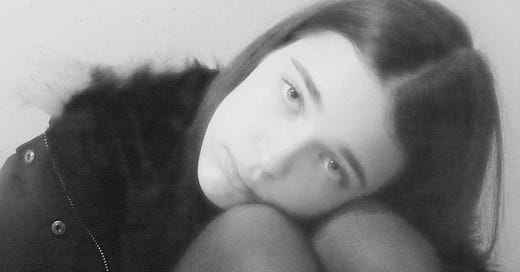If you’re interested in a one-hour audio recorded reading that gives you strategies for solving an issue that you’re facing, write me:
zeitvillemedia@protonmail.com
I’ll send you a small FAQ sheet and put you on a short waitlist. An authenticated birth time (hour and minute) is required to participate.
My ebooks are available for purchase here.
In the opening scene of “Buffalo 66,” which is Vincent Gallo’s 1998 directorial debut, we see Billy Brown leaving prison on a cold winter’s day.
He’s wearing tight clothes that seem to be the same color as the grey sky he passes under.
Patches of snow graze his flame red boots.
The image we have of him is a man of danger, burning inside with fiery passion—but also sensitive, fragile as ice. Did society turn away from him, or did he turn away from society? It’s all reminiscent of Matthew Chapter 10 in the New Testament, when Jesus grants 12 apostles the ability to heal disease:
If anyone will not welcome you or listen to your words, leave that home or town and shake the dust off your feet.
I am sending you out like sheep among wolves. Therefore be as shrewd as snakes and as innocent as doves.
Acceptance and being misunderstood are the topics I want to focus on today, because I think these will play a leading role in early 2025.
Many of us will be trying to make sense of the new freedoms being afforded to us.
We may be questioning how much we align with current trends. We may wonder if the “world” will accept us as we truly are.
We may sense that life is unfair right now, because if we take the actions we are called to pursue, it disrupts the status quo. “It’s all too messy. Why can’t everything be normal?”
What I hope to show you is that, like Billy, you CAN bet on yourself.
It’s very likely that you have a longing for a more nourishing time—but you can use those memories or that nostalgia to carve a path of meaning for yourself.
It’s likely, too, that you will carve the path one step at a time. Inwardly, then outwardly.
Autumn flooded us with visions of horizons. It put the focus on the external world. But we face a different task now: taking the heat of our heart and applying it to the unyielding ice of this new reality.
You may not find utopia, but your deepest desires will shape the ice of this brave new world, revealing facets and new ways of seeing the landscape.
Contrary to social media influencers, it’s not about flipping a magic light switch and having life work smoothly again as everyone claps and the movie ends.
It’s more about you being a witness to your inner freedom, and realizing THIS is the new powerful opportunity sweeping across the globe.
If you get in this “market” early, you’re going to be WAY ahead of people by March.
So let’s look deeper at how Billy rediscovered a freedom that was always within him.
As he sits at a bus stop, the screen slowly fills with boxes revealing his memories inside prison. Throughout the film other experimental techniques are used to depict Billy’s fractured consciousness. And so we see a man through many facets, just like now at the start of 2025 we see the world through many facets.
Is this a freezing, hostile world? Or is it a blank canvas awaiting our fresh and fiery passions, promising us a new frontier to pioneer?
“Buffalo 66” plays with this ambiguity, depicting the coldness of modern alienation and the warmth of risk.
The film is largely centered on family dynamics, specifically how they shape our understanding of freedom. This topic is largely on the collective mind as we anticipate Inauguration Day, hoping that the 2020s will offer something different than the Great Recession and the Pandemic—two defining events of the previous cycle that greatly impacted how we experience home and work.
In my previous newsletter, “The Final Form,” I tracked how social media came out of the Great Recession. This technological development was pushed to the limits during the Pandemic, as we tried to create virtual substitutes for everything—including a sense of personal sanity. Many melted down on social media, while others scrolled in silence, seeking a digital sanctuary.
These developments affected how both Millennials and Zoomers understand freedom, apart from the Boomer Generation.
Boomers had access to a different type of meaning than us. Cohesive collective culture was their core experience, whereas subsequent generations witnessed a loss of that Big Tent society—prompting them to strike out with new modes of expression, but not always successfully (many people have parodied modern hipster culture and startup culture).
Consequently, the fear of failure looms large now. Standing out is seen as too much of a risk in many cases.
So let’s dive into this film and see what lessons we can find.
Memories Unboxed
Billy certainly struggles with the possibility of failure. Upon release, he doesn’t know what’s worse: going back to prison or visiting his parents, who he hasn’t seen for many years.
His parents don’t know he’s been in prison, either.
Arriving in downtown Buffalo, New York, he goes into a tap dance studio to use the bathroom. We see Layla, played by Christina Ricci, dancing in the back of a class. The viewer has to look closely, but there’s a tear streaming down Layla’s face. Even though she’s deep in her fiery passion, she’s clearly also in a personal winter, wearing an ice blue dress.
Billy borrows a quarter from her and uses the payphone to call his parents. He’ll be right over. We can see the pent-up frustration snap, and he kidnaps Layla, setting the plot in motion.
We come to see that Layla is much like Billy. She’s faced with a question: does she go back to her old life, or forge ahead into this new reality?
Billy persuades her to act like his wife. He names her Wendy Balsam, concocting a story that will make his parents feel proud. He’ll tell them they met at a government job.
The meeting goes horribly. Layla realizes that Billy’s parents often use him as a landfill, dumping their own failed ambitions onto him—regretting the times they missed out on taking risks.
Billy’s mother watches TV most of the time, lamenting that the only Buffalo Bills football game she ever missed was on the day she gave birth to Billy.
His father on the other hand is a great singer—a talent he displays for Layla by singing “Fools Rush In”—but he’s too jaded now to take his dream full time. “Let’s go eat,” he groans when Layla asks him to sing another tune.
Billy and Layla leave, having felt that the visit “home” was more like a re-opening of a wound. They go to a bowling alley to regain their confidence. Billy bowls multiple strikes, and Layla performs a short tap dance. “I’m back!” Billy shouts.
But the regained confidence is put to the test again.
Seeking food at a diner, they’re accosted by the real Wendy Balsam, who we learn was a neighborhood friend of Billy’s. She’s with her fiance, looking successful and beautiful. As she walks down memory lane, we see that Billy plays a role in her life that’s very similar to the role he plays in his parents’ lives.
He’s a shadowy figure to them all, too free in his own heart to really fit in with their schemes and understandings of “normal reality.”
In many ways he’s wrongfully pitied by them and framed as a morally ambiguous character. In actuality, he’s an extremely resourceful and caring individual who has a lot to give the world.
Layla notices this pattern, which awakens her heart—and this melts the ice of a strange new world, making her see things in a different light.
The back half of the movie is her trying to show Billy that she’s faced similar battles. We learn that Billy was in jail because he racked up a huge debt betting on Buffalo Bills football games—until a bookie forced him to confess to a crime he didn’t commit, as punishment for unpaid debt.
What debts have we racked up because we’ve been chasing a sense of belonging in a world that no longer exists?
And how might those debts be forgiven?
Let’s wrap up with some final thoughts.
Stutter-Stop-Start
One of the film’s most captivating aspects is Billy’s speech pattern.
His natural way of expressing himself often leads to stuttering.
He’ll try out a phrase five or six different times, until he finds a groove, a rhythm, a path forward.
It may seem like a disability to a skeptical outsider, but to a close confidant like Layla, it comes off as heartfelt jazz.
In one scene, Billy drags Layla into a photo booth, telling her that they will make an album of memories.
But here’s the catch: he wants her to act like they’ve known each other for years.
This is before Billy makes peace with his inner freedom. He’s still too concerned with how the status quo will perceive him, particularly his parents.
He wants Layla to send the pictures to his parents, along with a Christmas card.
Layla sits on his lap and he says:
We span time together. We span time together as a couple.
Cause we’re a loving couple, spanning time.
The photos are us in love, spanning time.
No bullshit faces. No funny faces. Just look like you like me. That’s all I want.
This dialogue could easily sound like a conversation in the social media age, where culture is obsessed with public milestones and “picture perfect” moments.
All that pressure comes crashing down on Billy after Layla meets the real Wendy Balsam, as described in the diner scene above.
With the help of Layla’s patient listening, Billy comes to accept that the real prison is not fully embracing your gifts.
The film does a great job depicting this transmutation, because it doesn’t turn Billy into some perfectly grammatical smooth talker once he takes a risk on himself.
He still stutters, repeats himself, talks in circles. But it’s tuned up, re-engineered, firing in a way that feels rhythmic. Others hear the music now, like the elderly man he buys hot chocolate from, as a treat for Layla.
In the last newsletter, I talked about the value of stillness and reflection at the end of 2024.
It’s like the stillness remains in the air. We hang in anticipation, trying to see the facets of 2025.
It’s like turning a jewel of ice in our hands.
From this place, we can sound a few notes into the void, hearing a new noise on the wind, something that reminds us of the comfort of home.
It’s the beating rhythm of our true heart, breaking away from the monochrome mass, promising us that we are the torchbearers we have been looking for, serving as a link from the past into the future.
If you’re interested in a one-hour audio recorded reading that gives you strategies for solving an issue that you’re facing, write me:
zeitvillemedia@protonmail.com
I’ll send you a small FAQ sheet and put you on a short waitlist. An authenticated birth time (hour and minute) is required to participate.
My ebooks are available for purchase here.










